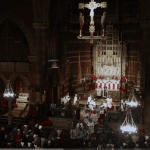One of the most frustrating misconceptions borne out of the commercial Christian worship movement is the idea that music equals worship. This misconception can take on several forms, at least.
- That the music part of a liturgy, mass, or service is the “worship time,” and everything else the “preaching” or “teaching time.”
- That music activates deep emotions that become worship when paired with spiritual feelings.
- That music itself is a sacrament, ushering worshipers into God’s presence. In fact, I would argue that the contemporary church has made music into a substitute Eucharist.
As a result of these and other facets of the music/worship conflation, those of us who play a part in facilitating music for worship often find ourselves with titles thrust upon us, such as “worship leader,” “lead worshiper,” “Minster of Worship.” I’ve found that many of us, actually, are unsure as to what role we actually do play in worship, and when in the performance of that role we are actually worshiping.
Chuck King, a personal mentor of mine and the former Music Pastor of College Church in Wheaton, Illinois, wrote this column to his Chancel Choir a number of years ago. I’ve referred to it many times myself when trying to get my mind around how my job relates to the worship of the church, and my own personal acts of worship. I think it’s good reflection for this time of year, especially as many of us are heading into a long, stressful weekend in service of God and God’s people’s worship.
We enjoy a rare and glorious privilege . . . to sing God’s praises and his Word in the assembly of his people. But is this worship? Well, yes and no.
Music-making, even music-making that is supremely centered on the biblical revelation of our glorious God, is not by itself “worship.” Or at least is not by itself “authentic worship.” It may be idolatry, it may be self-centered, it may be culturally significant, it may even be extraordinarily emotional. But when is music-making worship?
It is no secret that those who prepare and “lead” also get the greatest benefit from their labors. There are three elements of worship in this task:
Labors: Our worship is our work at what we do for God’s glory. In a ver real biblical sense, Thursday rehearsals are a “worship time”! Worship is giving God his due with the devotion of our bodies, time, and energy.
Preparation: Our worship is what we do with our hearts and hands. “Who may ascend the hill of the Lord? He who has clean hands and a pure heart . . . [S]uch is the generation of those who seek him” (Ps 24). So for us it is not only the musical work, but our heart’s and our life’s connection to what we sing.
Leading: Making music in corporate worship is never for ourselves, but always to draw others into the joyous understanding of what we have learned and sing. Leading is worship when it is “the fruit of lips that confess his name” (Heb. 13).
Ours is a special joy and obligation. May we become “living sacrifices, holy and pleasing to God.”
Sing on!














